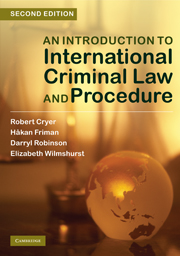Book contents
- Frontmatter
- Contents
- Preface to the Second Edition
- Table of Cases
- Table of Treaties and other International Instruments
- Table of Abbreviations
- PART A INTRODUCTION
- PART B PROSECUTIONS IN NATIONAL COURTS
- PART C INTERNATIONAL PROSECUTIONS
- PART D SUBSTANTIVE LAW OF INTERNATIONAL CRIMES
- PART E PRINCIPLES AND PROCEDURES OF INTERNATIONAL PROSECUTIONS
- PART F RELATIONSHIP BETWEEN NATIONAL AND INTERNATIONAL SYSTEMS
- 20 State Cooperation with the International Courts and Tribunals
- 21 Immunities
- 22 Alternatives and Complements to Criminal Prosecution
- 23 The Future of International Criminal Law
- Index
- References
20 - State Cooperation with the International Courts and Tribunals
from PART F - RELATIONSHIP BETWEEN NATIONAL AND INTERNATIONAL SYSTEMS
Published online by Cambridge University Press: 05 June 2012
- Frontmatter
- Contents
- Preface to the Second Edition
- Table of Cases
- Table of Treaties and other International Instruments
- Table of Abbreviations
- PART A INTRODUCTION
- PART B PROSECUTIONS IN NATIONAL COURTS
- PART C INTERNATIONAL PROSECUTIONS
- PART D SUBSTANTIVE LAW OF INTERNATIONAL CRIMES
- PART E PRINCIPLES AND PROCEDURES OF INTERNATIONAL PROSECUTIONS
- PART F RELATIONSHIP BETWEEN NATIONAL AND INTERNATIONAL SYSTEMS
- 20 State Cooperation with the International Courts and Tribunals
- 21 Immunities
- 22 Alternatives and Complements to Criminal Prosecution
- 23 The Future of International Criminal Law
- Index
- References
Summary
Characteristics of the cooperation regimes
State cooperation with the Tribunals and the ICC – the ‘external part’ of the judicial process – departs in many important ways from State-to-State cooperation in criminal matters (see Chapter 5). The obligations vis-à-vis the international jurisdictions are more far-reaching since these jurisdictions are created by the international community to investigate and prosecute the most serious crimes of international concern. As regards the Tribunals, and Security Council referrals of situations to the ICC, they also explicitly form part of international efforts to preserve or restore international peace and security. In addition, traditional restrictions on cooperation can be renounced since the international jurisdictions must act in accordance with the highest international standards of procedures and protection of individual rights.
The successful operation of these institutions is completely dependent upon international cooperation. They may not and cannot themselves implement their decisions, such as an arrest warrant, on the territory of a State, and they do not have their own police force. As the ICTY Appeals Chamber concluded in its landmark decision in Blaškić, enforcement powers must be expressly provided and cannot be regarded as inherent in an international criminal tribunal. Cooperation is therefore at the heart of effective international criminal proceedings, but this dependence has led to many difficulties in practice.
The Blaškić decision found that inter-State and State-Tribunal cooperation follows different models; the former is ‘horizontal’ and the latter ‘vertical’ in nature. This characterization is now commonly used.
- Type
- Chapter
- Information
- An Introduction to International Criminal Law and Procedure , pp. 509 - 530Publisher: Cambridge University PressPrint publication year: 2010
References
- 1
- Cited by



